 I loved Mabool. Orphaned Land’s 2004 comeback album was a seminal moment in my journey not just as a metal aficionado, but as a music lover in general. I was even fortunate enough to catch the album just shortly after its initial release, instead of years after the fact as would become a prevailing trend for me later on. It was to say the least, an incredibly timely release: An Israeli metal band delivering a conceptual album about the reunification of the three Abrahamic faiths smack dab in the middle of the Second Intifada, the wars in Iraq and Afghanistan, and a mere year away from Ariel Sharon’s earth shattering declaration to pull out of Gaza. You could either call that incredibly ballsy, or brazenly foolish.
I loved Mabool. Orphaned Land’s 2004 comeback album was a seminal moment in my journey not just as a metal aficionado, but as a music lover in general. I was even fortunate enough to catch the album just shortly after its initial release, instead of years after the fact as would become a prevailing trend for me later on. It was to say the least, an incredibly timely release: An Israeli metal band delivering a conceptual album about the reunification of the three Abrahamic faiths smack dab in the middle of the Second Intifada, the wars in Iraq and Afghanistan, and a mere year away from Ariel Sharon’s earth shattering declaration to pull out of Gaza. You could either call that incredibly ballsy, or brazenly foolish.
But something truly dramatic happened: This Israeli metal band had struck a powerful chord throughout various Arab countries where their music was being pirated. The internet in its increasingly flourishing ability to outreach, unite, and amass people from all over the globe was the first piece of evidence that something truly profound was happening. I was on the band’s message boards during that time period, and you’d see users posting not only from Israel, but from Turkey, Egypt, Syria (seriously), and almost any other Middle Eastern/Islamic land you could point out on a map. The album was a success yes, but for so many more reasons than just commercially speaking. Orphaned Land were transcendent in ways that their region’s political leaders were unable to be.
The album’s impact on me personally was a revelation. I had equated the very concept of folk metal with artists like Vintersorg and Ensiferum, as well as in the numerous Celtic-isms of a wide variety of metal bands. An exclusively Celtic/Scandinavian art form then…? It was, to say the least, a limited perspective. It had never occurred to me that yes, there could be folk metal that drew upon the musical heritage of other cultures. Mabool was the album that smacked me in the face and said, “Of course it can”. Songs like “Birth of the Three”, “Ocean Land”, “The Kiss of Babylon”, and the masterful “Norra El Norra” were laced and imbued with rich Middle Eastern/Judaic instrumentation and melodies. It wasn’t just the metal that was satisfying, I found the soundscapes of the ethnic musical backdrops extremely alluring. It all captured my imagination and swept me away to someplace else — it was an epiphany! And it soon occurred to me that this was a kind of metal that I had been longing for without even realizing it.
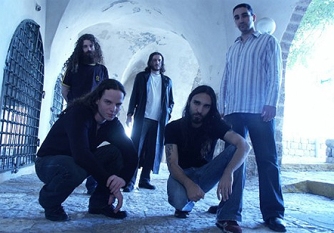 In time, after many hundreds of repeat spins, Mabool also left me with a void in my music collection: I had discovered a new found hunger and soon to be great appreciation for cultural music of the Middle East. I asked the band for recommendations through their forums, and was supplied a short list by Yossi Saharon, the Orphaned Land guitarist. I found that this newly acquired musical interest would only increase in momentum — I began seeking out, sampling, and buying international/cultural music regardless of where on the globe it was sourced from. My job in the music department of a Borders Books only aided my drive to find more and more. The store would be sent promo CDs from various record companies for in store play, and when the promo shelf had to be emptied at the end of the month (by employees getting to select stuff they wanted to take home… a definite perk), the dregs that no one else wanted were always a vast array of modern and traditional international music: French pop, Brazilian jazz, Gregorian Chant, Greek/Mediterranean folk, fifty different subgenres of music from Africa, in short, everything you could possibly imagine. I found a treasure trove of great stuff that I loved, and eventually this experimentation and growth lead to me appreciating stuff like the hip hop of Jurassic 5, or even the alt-country of Uncle Tupelo, Wilco, and Neko Case. It certainly wasn’t the first time I’d explored non rock/metal music, but Mabool tapped open a geyser of interest and curiosity in exploring new sounds that thankfully hasn’t stopped.
In time, after many hundreds of repeat spins, Mabool also left me with a void in my music collection: I had discovered a new found hunger and soon to be great appreciation for cultural music of the Middle East. I asked the band for recommendations through their forums, and was supplied a short list by Yossi Saharon, the Orphaned Land guitarist. I found that this newly acquired musical interest would only increase in momentum — I began seeking out, sampling, and buying international/cultural music regardless of where on the globe it was sourced from. My job in the music department of a Borders Books only aided my drive to find more and more. The store would be sent promo CDs from various record companies for in store play, and when the promo shelf had to be emptied at the end of the month (by employees getting to select stuff they wanted to take home… a definite perk), the dregs that no one else wanted were always a vast array of modern and traditional international music: French pop, Brazilian jazz, Gregorian Chant, Greek/Mediterranean folk, fifty different subgenres of music from Africa, in short, everything you could possibly imagine. I found a treasure trove of great stuff that I loved, and eventually this experimentation and growth lead to me appreciating stuff like the hip hop of Jurassic 5, or even the alt-country of Uncle Tupelo, Wilco, and Neko Case. It certainly wasn’t the first time I’d explored non rock/metal music, but Mabool tapped open a geyser of interest and curiosity in exploring new sounds that thankfully hasn’t stopped.
Now Orphaned Land has a tendency to work slowly. Well that’s actually unfair and inaccurate, but it could justifiably be the casual perception. There was an eight year gap between the band’s pair of mid-nineties releases and Mabool (explained vaguely as personal problems), and the success of that album demanded a touring schedule of three to four years — presumably to make up for lost time. Work on the follow up record took another couple years due to having to wait for their producer’s schedule to synch up (Porcupine Tree founder Steven Wilson), and so it was finally in 2010, six years later, when the band released The Never Ending Way of the ORwarriOR. I was as eager for the album as I was for that year’s new Blind Guardian and Iron Maiden records, and the heights of that anticipation would conversely be the depths to which I found myself disappointed.
 I thought the album had a pair of good tracks, but the rest had failed to move me in any way. I know it sounds a little dramatic now, but I felt disheartened that after the impact of Mabool and the (I hate to use this word) “journey” it took me on, the band who delivered that eternal classic was somehow unable to impact me any further. When I looked at reviews all over, the general reception was overwhelmingly positive and glowing… so how was I left out in the cold this time around? I had burned myself out on Mabool through excessive overplaying, yet I couldn’t find enthusiasm for their new stuff. When the band played close to me on a subsequent North American tour supporting Katatonia, I missed the date and didn’t feel bad about it. Wow I’d think, my opinion had really soured on these guys. It really was a little depressing… and so I chalked it all up to an unfortunate loss, and moved on.
I thought the album had a pair of good tracks, but the rest had failed to move me in any way. I know it sounds a little dramatic now, but I felt disheartened that after the impact of Mabool and the (I hate to use this word) “journey” it took me on, the band who delivered that eternal classic was somehow unable to impact me any further. When I looked at reviews all over, the general reception was overwhelmingly positive and glowing… so how was I left out in the cold this time around? I had burned myself out on Mabool through excessive overplaying, yet I couldn’t find enthusiasm for their new stuff. When the band played close to me on a subsequent North American tour supporting Katatonia, I missed the date and didn’t feel bad about it. Wow I’d think, my opinion had really soured on these guys. It really was a little depressing… and so I chalked it all up to an unfortunate loss, and moved on.
It was with a great deal of surprise that I began to hear rumors of a potential new Orphaned Land album slated for release in 2013. Of course, I had heard that kind of optimistic thinking before with this band, but hell, there I was this past Spring looking at the new cover artwork for All Is One. What — no half a decade plus wait? As stunning as it was that these guys managed to break old habits and actually deliver a new record within a reasonable time frame, I was a bit bummed out to realize that I had a mere speckle of interest when it came to checking it out, and certainly with a great degree of skepticism at that. My doubt was suddenly called into question when I heard the title track previewed on Dr. Metal’s The Metal Meltdown radio show. It was good, damn good — freaking beautiful actually. Right after I heard it, I found out that a friend of mine who does a rather excellent podcast (@ MSRcast) had interviewed Orphaned Land’s vocalist and founding member Kobi Farhi some weeks ago, and listening to their conversation was intriguing enough to make me plunk down for the album come release day.
My faith in Orphaned Land has been restored: All Is One is a fine album that while marking a noticeable stylistic shift in their trademark sound, beautifully weaves together disparate musical genres together into one epic, majestic, worldly fusion. It must be noted however, that for the most part gone are the frequent death metal vocals of yore, only popping up once on this album (to great effect at that). Is this the start of a post-metal Orphaned Land ala Opeth? Eh… no, not exactly. This is more Orphaned Land meets hard rock guitars as well as an progressive-power metal songwriting approach ala Blind Guardian. Think that sounds like an absurd comparison? Take a listen to the glorious, life affirming title track where scores of Guardian-esque choral voices join in on the most beautifully penned refrain in the band’s discography. Orchestras swoop in and usher melodic refrains throughout over a bed of crunchy guitars, hand claps spice up the percussion throughout, all surrounding an epic guitar solo that resides at the heart of this gem of a song (I also love the surreal, trippy, psychedelic music video they’ve done for the track). Additionally, on the rather charmingly rhythmic “The Simple Man”, guitars riff and play lead melodies in an intertwining that recalls Andre Olbrich and Marcus Siepen at their complicated best — all whilst Kobi Farhi’s lead vocals are embellished and sustained by intricately patterned supporting choral vocal harmonies. The newest addition to the band, guitarist Chen Balbus, seems to have a far greater natural chemistry with Yossi Saharon then his predecessor. The interplay between the two is fun, surprising, and rich.
 Of course, the album is laden with all the traditional Arabic/Israeli (oh hell lets just call it “Oriental”, Edward Said enthusiasts be damned) that we’ve come to expect from Orphaned Land. There’s oud, saz, bouzouki, chumbush, apparently even a xylophone at some point, and of course the aforementioned tremendous strings and choirs. The band splashed out for this record, amassing a talent pool of over forty musicians “including 25 choir singers and eight classical violin, viola and cello players from Turkey”. Its a smart play, one that lines the sound of this album with an open fullness, a sense of spatial relationships between instruments that their older records, yes even Mabool, were unable to attain through having to rely solely on keyboards. As for the scarcity of death metal vocals I mentioned above, I don’t find myself missing them, or believing that these songs would be better served with them. Farhi has always had a fine, well accented clean delivery as a pure singer, and when he does decide to lay the death vocal wood, on “Fail”, its a powerfully shuddering standout moment. I’d be remiss if I didn’t remark upon his fantastic clean vocals on that particular song, as well as on the haunting, emotional “Brother” — which contains perhaps the band’s finest lyric.
Of course, the album is laden with all the traditional Arabic/Israeli (oh hell lets just call it “Oriental”, Edward Said enthusiasts be damned) that we’ve come to expect from Orphaned Land. There’s oud, saz, bouzouki, chumbush, apparently even a xylophone at some point, and of course the aforementioned tremendous strings and choirs. The band splashed out for this record, amassing a talent pool of over forty musicians “including 25 choir singers and eight classical violin, viola and cello players from Turkey”. Its a smart play, one that lines the sound of this album with an open fullness, a sense of spatial relationships between instruments that their older records, yes even Mabool, were unable to attain through having to rely solely on keyboards. As for the scarcity of death metal vocals I mentioned above, I don’t find myself missing them, or believing that these songs would be better served with them. Farhi has always had a fine, well accented clean delivery as a pure singer, and when he does decide to lay the death vocal wood, on “Fail”, its a powerfully shuddering standout moment. I’d be remiss if I didn’t remark upon his fantastic clean vocals on that particular song, as well as on the haunting, emotional “Brother” — which contains perhaps the band’s finest lyric.
I find it interesting that one of the most vocal admirers of the band’s previous album, ORwarriOR, the one and only Angry Metal Guy, has given their newest work a right panning. His primary criticism is that the majority of this album remains at a similar tempo throughout and lacks the varietal structure of albums past. I guess something like that doesn’t bother me, because as long as the music itself is of interest in the moment, I don’t consider its relationship to the songs surrounding it. But taking a step back I suppose I can concede to this being a weakness of the album, and surmise that that perhaps the band’s inclinations away from their metallic tendencies has homogenized their overall songwriting approach. I don’t however, agree with AMG’s take that a shorter gestation period for this band will undoubtedly lead to inferior results. First of all, I’m enjoying this record, but more importantly, these guys are too talented to let precious years go by in the name of delays or worse — absolute perfection. I don’t need perfection. Not even Mabool was perfect (it dipped in the second half a bit), but it had moments of perfection. Same goes right now… I’ll eagerly anticipate a record every two to three years if it means I get gems like the ones found on All Is One.

While I disagree with AMG’s take (and am only singling out his review in this instance because I so rarely do), I do have to give him credit for making me go back to give ORwarriOR another shot. Of course the fantastic new album is also encouraging me in that regard, my Orphaned Land fandom once again flourishing, but his adamant stance that I’m missing out on something close to perfection is reason enough for me. And here’s the thing… I’m finding that ORwarriOR is steadily growing on me. There are still some moments throughout that aren’t striking the right chord but I’m beginning to enjoy songs that I previously thought were clunkers. There’s a lot to digest there, so I’ll keep working on it — the best thing being that I want to give it repeated spins to see if anything else sticks. It feels good to have a second chance at something like that, and of course, if you’ve been a regular reader of The Metal Pigeon, you’ll be realize that its becoming my M.O. for the most part.
So All Is One may ultimately not have the perspective altering impact that Mabool had for me. But that’s okay, albums like that are rare, and often not recurring from the same artist. It will have the personal distinction of being the album that gave me one of my favorite bands back, almost like reconnecting with an old friend. A metal band that avoids topical cliches and genre tropes, seeks diversity both musically and topically, Orphaned Land are a uniquely rare breed. I can’t help but feel a little inspired by this unexpected turn of events, and as odd as it may be to say, I feel like it may be speaking to something deeper within me on a personal level. This is a music first oriented blog, so I’ll just leave it at that, but its comforting to know that I’m not yet jaded to a point where music is reduced to only being surface entertainment. I hope it never does.
[youtube=http://www.youtube.com/watch?v=Bds3FALcR7M&w=560&h=315]
[youtube=http://www.youtube.com/watch?v=qsPb1-uPIic&w=560&h=315]

 Its probably getting a bit predictable by now, that is, the overwhelmingly positive reaction to Queensryche’s new self titled/post-Geoff Tate release. That there are so many interested parties taking a look at this album is perhaps indicative of how high in profile the band’s name has risen thanks to the online spillover of a courtroom/behind the scenes drama that has played out this past year for all to see. In terms of the PR war, there was a clear winner between the competing Queensryche’s long before a shred of new music was even heard from either party: Tate decided that his career would be best served by resembling a slow-crashing, flaming husk of a zeppelin. His version of the band is an internet laughing stock (run a search on blabbermouth for hilarious proof), and his consistently sub-par live performances in the name of Operation:Mindcrime’s 25th anniversary are filmed by concertgoers and uploaded to YouTube as documented proof of his deteriorating vocal ability, his sub-amateur band, and
Its probably getting a bit predictable by now, that is, the overwhelmingly positive reaction to Queensryche’s new self titled/post-Geoff Tate release. That there are so many interested parties taking a look at this album is perhaps indicative of how high in profile the band’s name has risen thanks to the online spillover of a courtroom/behind the scenes drama that has played out this past year for all to see. In terms of the PR war, there was a clear winner between the competing Queensryche’s long before a shred of new music was even heard from either party: Tate decided that his career would be best served by resembling a slow-crashing, flaming husk of a zeppelin. His version of the band is an internet laughing stock (run a search on blabbermouth for hilarious proof), and his consistently sub-par live performances in the name of Operation:Mindcrime’s 25th anniversary are filmed by concertgoers and uploaded to YouTube as documented proof of his deteriorating vocal ability, his sub-amateur band, and 
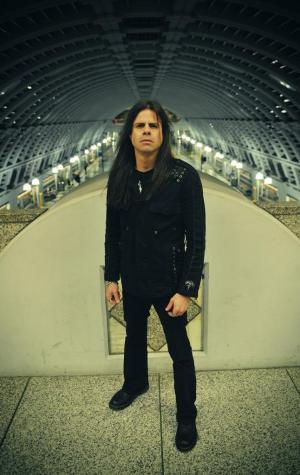 You might notice I haven’t mentioned anything about the performance of new vocalist, ex-Crimson Glory singer Todd LaTorre. And that’s because any question of his abilities should have been put to rest long before this album’s release… I refer of course to the numerous recordings available of his concert performances doing high justice to the band’s back catalog. When you hear recordings of him singing “I Don’t Believe In Love” the way its hasn’t been sung in years, your worries about his performance on a new album go out the window. Before I even had the opportunity to listen to this album, I witnessed the band playing live here in Houston on June 8th on a humid Saturday night. The band was on excellent form, but Todd LaTorre was simply on fire, the damp air and warm weather making an outdoor stage the perfect setting for me to witness the single greatest live vocal performance I have ever heard. It was possible that the versions of classics from the Warning and Rage For Order albums that I heard that night were actually better than the original recordings. For periodic moments during the show, I was in utter disbelief at how fantastic he actually was — it was like watching Lebron in Game 7. At one point a guy next to me shook me by the shoulder excitedly and shouted “Can you believe this guy?!” I responded back, alarmed, “Crazy eh!”
You might notice I haven’t mentioned anything about the performance of new vocalist, ex-Crimson Glory singer Todd LaTorre. And that’s because any question of his abilities should have been put to rest long before this album’s release… I refer of course to the numerous recordings available of his concert performances doing high justice to the band’s back catalog. When you hear recordings of him singing “I Don’t Believe In Love” the way its hasn’t been sung in years, your worries about his performance on a new album go out the window. Before I even had the opportunity to listen to this album, I witnessed the band playing live here in Houston on June 8th on a humid Saturday night. The band was on excellent form, but Todd LaTorre was simply on fire, the damp air and warm weather making an outdoor stage the perfect setting for me to witness the single greatest live vocal performance I have ever heard. It was possible that the versions of classics from the Warning and Rage For Order albums that I heard that night were actually better than the original recordings. For periodic moments during the show, I was in utter disbelief at how fantastic he actually was — it was like watching Lebron in Game 7. At one point a guy next to me shook me by the shoulder excitedly and shouted “Can you believe this guy?!” I responded back, alarmed, “Crazy eh!”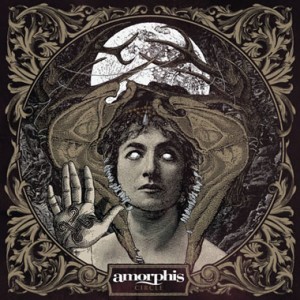 The stuff that’s really been connecting with me lately is in fact wintery dark, morose, bleak, and of course melancholic — and I’ve just decided to be okay with that. Better to write about stuff that’s resonating with me for whatever reason than force feed everyone some half-hearted take on the NEW ANVIL RECORD! So, first off, the new Amorphis album, Circle, is really striking a chord with me in a big way, and the I’ll be honest, I was one of those people who thought Amorphis got better when current vocalist Tomi Joutsen joined the band on 2003’s Eclipse. Okay, I loved Tales From A Thousand Lakes and Elegy, but then began the band’s strange, murky, experimental era, and I simply couldn’t zero in on any of those records. When Joutsen debuted on the “House of Sleep” single, I felt the band got some fire back. Coupled with the fact that there was also stronger emphasis on more rock based songwriting, Joustsen’s ability to deliver incredible melodic and emotional vocals resulted in a far more comfortable fit than Pasi Koskinen’s vocals ever could.
The stuff that’s really been connecting with me lately is in fact wintery dark, morose, bleak, and of course melancholic — and I’ve just decided to be okay with that. Better to write about stuff that’s resonating with me for whatever reason than force feed everyone some half-hearted take on the NEW ANVIL RECORD! So, first off, the new Amorphis album, Circle, is really striking a chord with me in a big way, and the I’ll be honest, I was one of those people who thought Amorphis got better when current vocalist Tomi Joutsen joined the band on 2003’s Eclipse. Okay, I loved Tales From A Thousand Lakes and Elegy, but then began the band’s strange, murky, experimental era, and I simply couldn’t zero in on any of those records. When Joutsen debuted on the “House of Sleep” single, I felt the band got some fire back. Coupled with the fact that there was also stronger emphasis on more rock based songwriting, Joustsen’s ability to deliver incredible melodic and emotional vocals resulted in a far more comfortable fit than Pasi Koskinen’s vocals ever could.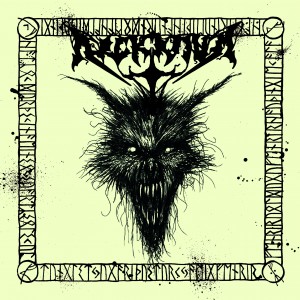 Amorphis took me by surprise, not in that I don’t expect good work from them, but in that I’ve been listening to the album nonstop in a way that I haven’t since I heard Elegy. But if that was a surprise then I’d have to say my enthusiasm for the latest Arckanum offering, Fenris Kindir, is coming as a total shock. This is without a doubt, the best black metal out in 2013 (I know, I know… Darkthrone, but is The Underground Resistance really black metal?), as well as the most immersive listening experience of the year. For those who don’t know, Arckanum has been essentially a one man solo project of Johan Lahger, and he’s made a lengthy go it in releasing albums since the mid nineties. I’ll confess, I’ve been unmoved by this project for the most part, despite being exposed to the past few years of releases… and as is the usual way these things go, I have no explanation for why those previous albums didn’t affect me yet the new one does — but there you go. There’s nothing accessible or commercial about this recording, its pure blistering black metal done in a nod to an old school style, with very little in the way of vibrant melodies.
Amorphis took me by surprise, not in that I don’t expect good work from them, but in that I’ve been listening to the album nonstop in a way that I haven’t since I heard Elegy. But if that was a surprise then I’d have to say my enthusiasm for the latest Arckanum offering, Fenris Kindir, is coming as a total shock. This is without a doubt, the best black metal out in 2013 (I know, I know… Darkthrone, but is The Underground Resistance really black metal?), as well as the most immersive listening experience of the year. For those who don’t know, Arckanum has been essentially a one man solo project of Johan Lahger, and he’s made a lengthy go it in releasing albums since the mid nineties. I’ll confess, I’ve been unmoved by this project for the most part, despite being exposed to the past few years of releases… and as is the usual way these things go, I have no explanation for why those previous albums didn’t affect me yet the new one does — but there you go. There’s nothing accessible or commercial about this recording, its pure blistering black metal done in a nod to an old school style, with very little in the way of vibrant melodies. Finally, something that was bound to happen… the first discussion of a non-metal-related album of music on The Metal Pigeon. Stick with me on this, because if you haven’t treated yourself to the sheer beauty and wonder that is composer Austin Wintory’s epic soundtrack for the PS3 downloadable gaming oddity called Journey, then you’re missing out on something really great. I actually don’t own a PS3, but thanks to YouTube I’ve been able to see the game played, and what I saw was a rather inspired and inventive take on merging gaming into pure visual/interactive art. It was IGN’s Game of the Year for 2012, a huge accomplishment for a small, independent developer overtaking such major heavyweights as Halo 4 for example. Well, I won’t launch into gaming talk here, but suffice it to say the very idea of Journey has a built in metal spirit — to me anyway. You wander alone at first, in this beautiful, desolate, epic landscape, always trying to get to this incredibly huge mountain that looms in the distance, and as you go through your “journey”, other players meet you in your world (or their world) and you can potentially aid one another onwards in your quest. Its an elegant visual metaphor for life, solitude, togetherness, and entropy.
Finally, something that was bound to happen… the first discussion of a non-metal-related album of music on The Metal Pigeon. Stick with me on this, because if you haven’t treated yourself to the sheer beauty and wonder that is composer Austin Wintory’s epic soundtrack for the PS3 downloadable gaming oddity called Journey, then you’re missing out on something really great. I actually don’t own a PS3, but thanks to YouTube I’ve been able to see the game played, and what I saw was a rather inspired and inventive take on merging gaming into pure visual/interactive art. It was IGN’s Game of the Year for 2012, a huge accomplishment for a small, independent developer overtaking such major heavyweights as Halo 4 for example. Well, I won’t launch into gaming talk here, but suffice it to say the very idea of Journey has a built in metal spirit — to me anyway. You wander alone at first, in this beautiful, desolate, epic landscape, always trying to get to this incredibly huge mountain that looms in the distance, and as you go through your “journey”, other players meet you in your world (or their world) and you can potentially aid one another onwards in your quest. Its an elegant visual metaphor for life, solitude, togetherness, and entropy.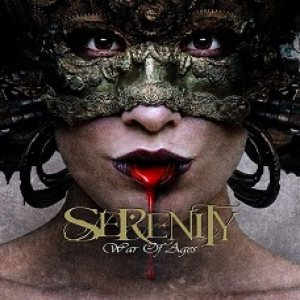 I’m increasingly more aware of how rare it is to stumble upon a band that can utterly transfix my wandering attention span the way Serenity did about a month ago with the release of their spectacular fourth album, War of Ages. The band hails from Austria, a country far more regarded in metal circles as a purveyor of death and black metal bands, most notably Belphegor. Serenity then must be the black sheep of their countrymen, as they specialize in a style of progressive power metal informed by the obvious influences of Kamelot, Sonata Arctica, and maybe even a touch of Avantasia’s latter day hard rock epic strut. This is not to say they are merely the sum of their parts, as Serenity have an identity all their own within the fundamentals of songwriting styles and lyrical concepts — but their influences are a good touchstone and filter for prospective listeners.
I’m increasingly more aware of how rare it is to stumble upon a band that can utterly transfix my wandering attention span the way Serenity did about a month ago with the release of their spectacular fourth album, War of Ages. The band hails from Austria, a country far more regarded in metal circles as a purveyor of death and black metal bands, most notably Belphegor. Serenity then must be the black sheep of their countrymen, as they specialize in a style of progressive power metal informed by the obvious influences of Kamelot, Sonata Arctica, and maybe even a touch of Avantasia’s latter day hard rock epic strut. This is not to say they are merely the sum of their parts, as Serenity have an identity all their own within the fundamentals of songwriting styles and lyrical concepts — but their influences are a good touchstone and filter for prospective listeners. Yes of course I emphasized songwriting, because while the musicianship Serenity display is of the excellent proficiency you’d expect from a European power metal band, the Buchberger/Neuhauser songwriting partnership is the critical heart of Serenity’s success. For anyone who felt/feels that something could potentially be permanently lost from the brilliance that was the Khan/Youngblood songwriting legacy — I’m telling you that the Buchberger/Neuhauser combo strikes right to the heart of the style of music that you and I both love, crave, and sadly can’t seem to find enough of. I’m talking about crisp, melodic, melancholy, triumphant, elegant, and yes actually HEAVY power metal that is written with a head for ambition, an ear for tunefulness, and a writer’s heart for great lyrics. And even though War of Ages is the album that sucked me in as a new fan of the band, I’ve become addicted to the other three albums in their discography as well. And one of the more brilliant examples of all of these aforementioned attributes combining to supreme effect can be found on the bonus track (!) of their 2011 Death & Legacy album, “To India’s Shores”.
Yes of course I emphasized songwriting, because while the musicianship Serenity display is of the excellent proficiency you’d expect from a European power metal band, the Buchberger/Neuhauser songwriting partnership is the critical heart of Serenity’s success. For anyone who felt/feels that something could potentially be permanently lost from the brilliance that was the Khan/Youngblood songwriting legacy — I’m telling you that the Buchberger/Neuhauser combo strikes right to the heart of the style of music that you and I both love, crave, and sadly can’t seem to find enough of. I’m talking about crisp, melodic, melancholy, triumphant, elegant, and yes actually HEAVY power metal that is written with a head for ambition, an ear for tunefulness, and a writer’s heart for great lyrics. And even though War of Ages is the album that sucked me in as a new fan of the band, I’ve become addicted to the other three albums in their discography as well. And one of the more brilliant examples of all of these aforementioned attributes combining to supreme effect can be found on the bonus track (!) of their 2011 Death & Legacy album, “To India’s Shores”. For the War of Ages album, the band made what I can only refer to as a savvy game changer of a decision. Enter into the Serenity lineup one Clémentine Delauney from Lyon, France, as the co-lead vocalist to pair alongside Neuhauser’s powerful voice. This isn’t a gimmick, as they have experimented with a handful of female guest vocalists for select tracks on previous albums — and while the songs and performances have been good (particularly a duet with the always excellent Amanda Somerville on Death and Legacy’s “Changing Fate”), the types of female voices they’ve attempted to pair with Neuhauser never seemed to measure up or alternatively, contrast well with his rich, distinctive tone. I know these women have their fans, but I’ve never been overly impressed with Charlotte Wessels, nor Ailyn from Sirenia, and while Somerville’s duet was excellent, her voice is as strong and full of character as Neuhauser’s and to me it seemed that when they would join together both voices would be fighting for space with no one winning out.
For the War of Ages album, the band made what I can only refer to as a savvy game changer of a decision. Enter into the Serenity lineup one Clémentine Delauney from Lyon, France, as the co-lead vocalist to pair alongside Neuhauser’s powerful voice. This isn’t a gimmick, as they have experimented with a handful of female guest vocalists for select tracks on previous albums — and while the songs and performances have been good (particularly a duet with the always excellent Amanda Somerville on Death and Legacy’s “Changing Fate”), the types of female voices they’ve attempted to pair with Neuhauser never seemed to measure up or alternatively, contrast well with his rich, distinctive tone. I know these women have their fans, but I’ve never been overly impressed with Charlotte Wessels, nor Ailyn from Sirenia, and while Somerville’s duet was excellent, her voice is as strong and full of character as Neuhauser’s and to me it seemed that when they would join together both voices would be fighting for space with no one winning out. I’ve been checking out the tour dates for the band and they’re disappointingly slim, even for Europe… (I have no delusions about the band getting to launch a full tour in the States — I’ll post a very grateful retraction if that ever happens). I’m not sure what the problem is, but I could venture to guess that these guys have day jobs, and that they try to fit Serenity in whenever they can. That’s understandable and to be expected given the state of things in the industry, but I hope they can do more then just a ten date headliner tour of clubs in Europe. But if that doesn’t, or can’t happen then I’d just have one word of advice for the band if they ever happened to read this: Write more songs, record more albums, document your art with a sense of urgency and ambition. You know its an uphill battle if you’re hoping to headline arenas or chart singles, there are very few Nightwish success stories in your chosen genre. So instead, strike while the creative irons are hot and get this stuff on tape. Build your artistic legacy.
I’ve been checking out the tour dates for the band and they’re disappointingly slim, even for Europe… (I have no delusions about the band getting to launch a full tour in the States — I’ll post a very grateful retraction if that ever happens). I’m not sure what the problem is, but I could venture to guess that these guys have day jobs, and that they try to fit Serenity in whenever they can. That’s understandable and to be expected given the state of things in the industry, but I hope they can do more then just a ten date headliner tour of clubs in Europe. But if that doesn’t, or can’t happen then I’d just have one word of advice for the band if they ever happened to read this: Write more songs, record more albums, document your art with a sense of urgency and ambition. You know its an uphill battle if you’re hoping to headline arenas or chart singles, there are very few Nightwish success stories in your chosen genre. So instead, strike while the creative irons are hot and get this stuff on tape. Build your artistic legacy.
 Eclectika – Lure of Ephemeral Beauty:
Eclectika – Lure of Ephemeral Beauty: Boneworm – s/t:
Boneworm – s/t: Boil – aXiom:
Boil – aXiom: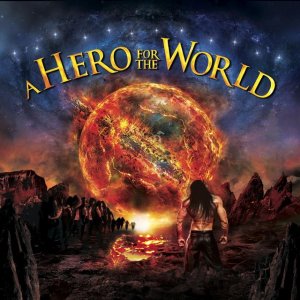 A Hero For the World – s/t:
A Hero For the World – s/t: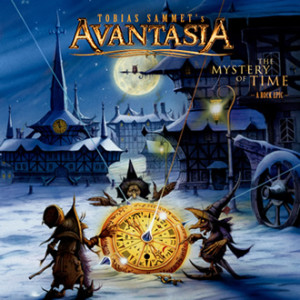 Since I’m going to be talking about Tobias Sammet and Avantasia, I’ll point out that this isn’t a conventional review in the sense that I’m trying to help you decide whether or not to check this album out — because of course you should. Sammet possesses a nearly peerless songwriting ability within the power metal/hard rock spectrum, and with said ability has delivered a career’s worth of superb work through Edguy and of course his solo/all-star project Avantasia. Every Sammet penned album can be guaranteed to contain a small to large handful of gems, and for that fact alone I believe he is worthy of respect and yes even gratitude. Speaking as a power metal fan, that level of consistency is a rare beast in a genre too often full of talented musicians who can’t write a decent tune. I became a fan of the man back in 2000 with Edguy’s seminal classic Mandrake, and both retrospectively and with each new release, Sammet continued to fill the soundtrack of my life with thundering, grandiose power metal epics and emotive, stirring ballads. Few others in power metal deliver the goods as well as he does. So as expected, there’s a lot on my mind regarding this record, and to better help myself keep all my thoughts in order I’ll be breaking this down into categorized, bite-sized chunks:
Since I’m going to be talking about Tobias Sammet and Avantasia, I’ll point out that this isn’t a conventional review in the sense that I’m trying to help you decide whether or not to check this album out — because of course you should. Sammet possesses a nearly peerless songwriting ability within the power metal/hard rock spectrum, and with said ability has delivered a career’s worth of superb work through Edguy and of course his solo/all-star project Avantasia. Every Sammet penned album can be guaranteed to contain a small to large handful of gems, and for that fact alone I believe he is worthy of respect and yes even gratitude. Speaking as a power metal fan, that level of consistency is a rare beast in a genre too often full of talented musicians who can’t write a decent tune. I became a fan of the man back in 2000 with Edguy’s seminal classic Mandrake, and both retrospectively and with each new release, Sammet continued to fill the soundtrack of my life with thundering, grandiose power metal epics and emotive, stirring ballads. Few others in power metal deliver the goods as well as he does. So as expected, there’s a lot on my mind regarding this record, and to better help myself keep all my thoughts in order I’ll be breaking this down into categorized, bite-sized chunks: Some really great songs
Some really great songs Eric Martin / No lame interludes!:
Eric Martin / No lame interludes!:  I’ve always admired great lyricists in metal and elsewhere, and I feel that I’ve been rather patient and forgiving for the typicality of mediocre lyrics that permeate so much of metal. Power metal is unfortunately guilty of harboring some horrendous lyrical massacres, and my love of the overwhelming enjoyability of the genre has forced me to simply accept it as the norm. Sammet isn’t the worst lyricist in power metal — far, far from it — he often writes about interesting subject matter and has a particular English as a second language way with a phrase that is endearing. But I wouldn’t go out of my way to call him a good lyricist either; he overuses words, phrases, and imagery often, he relies on abstraction to a fault, and his tendency to use malapropisms is simply maddening. I let a lot of that go… especially when it comes to lyricists who aren’t writing in their native tongue, but sometimes I wish they’d make use of a proofreader every once in awhile.
I’ve always admired great lyricists in metal and elsewhere, and I feel that I’ve been rather patient and forgiving for the typicality of mediocre lyrics that permeate so much of metal. Power metal is unfortunately guilty of harboring some horrendous lyrical massacres, and my love of the overwhelming enjoyability of the genre has forced me to simply accept it as the norm. Sammet isn’t the worst lyricist in power metal — far, far from it — he often writes about interesting subject matter and has a particular English as a second language way with a phrase that is endearing. But I wouldn’t go out of my way to call him a good lyricist either; he overuses words, phrases, and imagery often, he relies on abstraction to a fault, and his tendency to use malapropisms is simply maddening. I let a lot of that go… especially when it comes to lyricists who aren’t writing in their native tongue, but sometimes I wish they’d make use of a proofreader every once in awhile. I include Kiske because his vocals only work if he’s getting exceptional songs, as he has on past efforts. And while I loved “Sleepwalking”, surely Amanda Somerville would have been a far better choice than Yang — who while not bad, suffers from awkward phrasing, spotty enunciation, and an all around weird approach to vocals… is she trying to be R&B, pop, rock, or none of the above? Hell if I know! As for Byford — I’ve never been a big fan and I can’t help but think when listening to his feature track here, “Black Orchid”, how much better it’d sound if Jorn was on vocals instead.
I include Kiske because his vocals only work if he’s getting exceptional songs, as he has on past efforts. And while I loved “Sleepwalking”, surely Amanda Somerville would have been a far better choice than Yang — who while not bad, suffers from awkward phrasing, spotty enunciation, and an all around weird approach to vocals… is she trying to be R&B, pop, rock, or none of the above? Hell if I know! As for Byford — I’ve never been a big fan and I can’t help but think when listening to his feature track here, “Black Orchid”, how much better it’d sound if Jorn was on vocals instead. Its obvious to myself and other Sammet devotees that Avantasia has gotten most of his attention for the past half a decade now; consider that all of a sudden Avantasia’s total album count tallies at six, only three behind Edguy’s nine. In fact, since 2006, Sammet has delivered four full length Avantasia albums plus two EPs, while Edguy has only released three albums. If Avantasia has gotten the better half of Sammet’s songwriting for the past few years, its reasonable to say that Edguy has diminished in turn. Slowly, gradually, Avantasia has become Sammet’s main priority and Edguy is increasingly an afterthought.
Its obvious to myself and other Sammet devotees that Avantasia has gotten most of his attention for the past half a decade now; consider that all of a sudden Avantasia’s total album count tallies at six, only three behind Edguy’s nine. In fact, since 2006, Sammet has delivered four full length Avantasia albums plus two EPs, while Edguy has only released three albums. If Avantasia has gotten the better half of Sammet’s songwriting for the past few years, its reasonable to say that Edguy has diminished in turn. Slowly, gradually, Avantasia has become Sammet’s main priority and Edguy is increasingly an afterthought. In the case of Greece’s Rotting Christ, this was a band I hadn’t listened to in perhaps under a decade and had long ago written off as uninteresting (I’ve since checked out their back catalog on Spotify only to realize how wrong I was). Unbeknownst to me until now, they’ve been steadily pursuing a musical change of direction on their past couple albums, and its all led to the most radicalized experimentation of their career on Kata Ton Daimona Eaytoy (Do What Thou Wilt), their eleventh studio album to date. Quite simply put, I love this album. Its one of the more bizarre imaginings of black metal that I’ve ever heard really. These guys dig down deep into their Greek heritage for some dark musical inspirations that really separate them from the hordes of Norwegian copycats. Unexpected amounts of melodicism, unorthodox percussive rhythms, very inspired blackened vocal arrangements and original songwriting are just a few touchstones to remark upon. The obvious standout for its sheer accessibility is “Grandis Spiritus Diavolos”, a steadfast march in which the title phrase is repeated in staccato rhythm over a bed of ultra-melodic guitar riffs, some Uli Jon Roth-style solo accompaniment, and Therion-ish choir vocals. On “Cine Jubeste Si Lasa”, things get really bizarre with the addition of very ethnic, gypsy-like female vocals of Souzana Vougioukli that intertwine with Sakis Tolis’ ever blackened grim vocals to hypnotic effect. It took me awhile to process what was going on in the track, but its quickly become a favorite.
In the case of Greece’s Rotting Christ, this was a band I hadn’t listened to in perhaps under a decade and had long ago written off as uninteresting (I’ve since checked out their back catalog on Spotify only to realize how wrong I was). Unbeknownst to me until now, they’ve been steadily pursuing a musical change of direction on their past couple albums, and its all led to the most radicalized experimentation of their career on Kata Ton Daimona Eaytoy (Do What Thou Wilt), their eleventh studio album to date. Quite simply put, I love this album. Its one of the more bizarre imaginings of black metal that I’ve ever heard really. These guys dig down deep into their Greek heritage for some dark musical inspirations that really separate them from the hordes of Norwegian copycats. Unexpected amounts of melodicism, unorthodox percussive rhythms, very inspired blackened vocal arrangements and original songwriting are just a few touchstones to remark upon. The obvious standout for its sheer accessibility is “Grandis Spiritus Diavolos”, a steadfast march in which the title phrase is repeated in staccato rhythm over a bed of ultra-melodic guitar riffs, some Uli Jon Roth-style solo accompaniment, and Therion-ish choir vocals. On “Cine Jubeste Si Lasa”, things get really bizarre with the addition of very ethnic, gypsy-like female vocals of Souzana Vougioukli that intertwine with Sakis Tolis’ ever blackened grim vocals to hypnotic effect. It took me awhile to process what was going on in the track, but its quickly become a favorite. And then there’s new kids on the block Cnoc An Tursa, who defy cheeky boy-band references with what sounds to me like a perfect melding of folk-infused thrash ala early Ensiferum with some of the most excellent blackened vocals that I’ve heard in recent memory. I’ve seen these guys tagged as viking metal or folk metal, and that’s a gross oversimplification. First of all, forget the Viking stuff, these guys are a Scottish band that emphasize a musical and lyrical focus on their nation’s history and culture in a rather eloquent fashion. They draw upon the well of great Scottish poetry for their lyrical inspiration, as in “Bannockburn”, which depicts the battle that was central to the Robert Burns poem of the same name (and they do so in rather Burns-ian language themselves). On other tracks they essentially set a beloved Scottish poem to a bleak, wintry, blackened folk sound scape as with “Culloden Moor”, which works far better than the idea looks on paper.
And then there’s new kids on the block Cnoc An Tursa, who defy cheeky boy-band references with what sounds to me like a perfect melding of folk-infused thrash ala early Ensiferum with some of the most excellent blackened vocals that I’ve heard in recent memory. I’ve seen these guys tagged as viking metal or folk metal, and that’s a gross oversimplification. First of all, forget the Viking stuff, these guys are a Scottish band that emphasize a musical and lyrical focus on their nation’s history and culture in a rather eloquent fashion. They draw upon the well of great Scottish poetry for their lyrical inspiration, as in “Bannockburn”, which depicts the battle that was central to the Robert Burns poem of the same name (and they do so in rather Burns-ian language themselves). On other tracks they essentially set a beloved Scottish poem to a bleak, wintry, blackened folk sound scape as with “Culloden Moor”, which works far better than the idea looks on paper.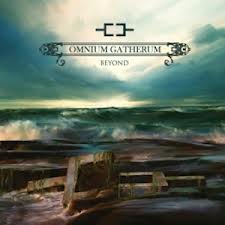 Finally, there’s been the newest release by Finland’s Omnium Gatherum, a band that I was initially introduced to through their highly acclaimed 2011 New World Shadows album. It took me quite awhile to really sink into that album, not because I found it lacking — the opposite actually, there was so much going on that was just way different from anything else I’d come to expect from melodic death metal. Odd drum patterns, alternately shifting tempos, bleak-washing atmospherics, and of course the obsidian vocals of Jukka Pelkonen. This is a weird comparison, but once I finally broke through with repeated listens, it felt like I had cracked the secrets of a musical Rubik’s cube — suddenly it all made sense and sounded right. So getting a chance to hear new music from these guys with that hurdle behind me has been a real pleasure. Their new album, Beyond, is to me an even better collection of music than it’s predecessor. Whether its on the lead single, “The Unknowing”, with its sweeping arpeggio based musical refrain that is as cinematic as it is memorable, or on the breathy, acoustic laced “Luoto” and its buildup to the hooky rock guitar driven “New Dynamic”; this album delivers with a diverse range of songs that stretch the band’s trademark sound. This is especially true on the clean vocal laden “Who Could Say”, in which Pelkonen seems to draw on equal parts Sentenced and Amorphis.
Finally, there’s been the newest release by Finland’s Omnium Gatherum, a band that I was initially introduced to through their highly acclaimed 2011 New World Shadows album. It took me quite awhile to really sink into that album, not because I found it lacking — the opposite actually, there was so much going on that was just way different from anything else I’d come to expect from melodic death metal. Odd drum patterns, alternately shifting tempos, bleak-washing atmospherics, and of course the obsidian vocals of Jukka Pelkonen. This is a weird comparison, but once I finally broke through with repeated listens, it felt like I had cracked the secrets of a musical Rubik’s cube — suddenly it all made sense and sounded right. So getting a chance to hear new music from these guys with that hurdle behind me has been a real pleasure. Their new album, Beyond, is to me an even better collection of music than it’s predecessor. Whether its on the lead single, “The Unknowing”, with its sweeping arpeggio based musical refrain that is as cinematic as it is memorable, or on the breathy, acoustic laced “Luoto” and its buildup to the hooky rock guitar driven “New Dynamic”; this album delivers with a diverse range of songs that stretch the band’s trademark sound. This is especially true on the clean vocal laden “Who Could Say”, in which Pelkonen seems to draw on equal parts Sentenced and Amorphis. There will be many — so so many reviews, opinions, forum rants, and of course YouTube comments that will take some pretty sharp, barbed digs with the metal pitchfork to this band and their new album The Nexus. Amaranthe offend many with a combination of sounds that hands tallied most metal fans would agree should not have ever been attempted. I’ve seen the old “just because something can be done, does not mean it should be done” line more than a few times in the past couple days. Conversely, this is a band with a surprisingly large contingent of often quite vocal supporters, many of them writing reviews for well known print and digital publications, and of course, they’ll be out there in full force online, equalizing the rebukes and jeers with various expressions of high praise — some of which will be ludicrously exaggerated. So here’s where I’ll step in, to offer a perspective from a fairly neutral middle ground.
There will be many — so so many reviews, opinions, forum rants, and of course YouTube comments that will take some pretty sharp, barbed digs with the metal pitchfork to this band and their new album The Nexus. Amaranthe offend many with a combination of sounds that hands tallied most metal fans would agree should not have ever been attempted. I’ve seen the old “just because something can be done, does not mean it should be done” line more than a few times in the past couple days. Conversely, this is a band with a surprisingly large contingent of often quite vocal supporters, many of them writing reviews for well known print and digital publications, and of course, they’ll be out there in full force online, equalizing the rebukes and jeers with various expressions of high praise — some of which will be ludicrously exaggerated. So here’s where I’ll step in, to offer a perspective from a fairly neutral middle ground.
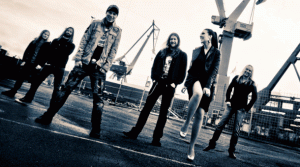 When you see the term “supergroup” applied to Amaranthe, its a total misnomer. While Mörck is fairly central to the Dragonland project, their music never attracted much notice beyond hardcore power metal devotees, and those of us who were enthralled with their take on Limahl’s “The Neverending Story” (yes THAT song) from 2002’s Holy War album. Mörck’s time in Nightrage has been limited to their post-2006 era, being the replacement for founding member Gus G. and arriving well after the acclaimed Tomas Lindberg era. Jake E. meanwhile is often noted as being a former member of Dream Evil, yet his time in the band yielded no recorded output, being only a brief stint as the band’s vocalist for six months. His tenure with the now-on-hiatus melodic power metal band Dreamland attracted little notice apart from being associated with Hammerfall’s Joacim Cans early in their development. I’ll avoid getting into the blips of time that the remaining Amaranthe members have been in their oft-cited past bands.
When you see the term “supergroup” applied to Amaranthe, its a total misnomer. While Mörck is fairly central to the Dragonland project, their music never attracted much notice beyond hardcore power metal devotees, and those of us who were enthralled with their take on Limahl’s “The Neverending Story” (yes THAT song) from 2002’s Holy War album. Mörck’s time in Nightrage has been limited to their post-2006 era, being the replacement for founding member Gus G. and arriving well after the acclaimed Tomas Lindberg era. Jake E. meanwhile is often noted as being a former member of Dream Evil, yet his time in the band yielded no recorded output, being only a brief stint as the band’s vocalist for six months. His tenure with the now-on-hiatus melodic power metal band Dreamland attracted little notice apart from being associated with Hammerfall’s Joacim Cans early in their development. I’ll avoid getting into the blips of time that the remaining Amaranthe members have been in their oft-cited past bands. On The Nexus, they seem to be following the don’t fix it if it isn’t broken blueprint, which is shrewd and smart, yet subject to a touch of the sophomore slump. And before I delve into that let me just state that this album isn’t a mind changer by any means. Whatever you felt after listening to that first album is likely what you’re going to feel if you decide to listen to this one. As I mentioned before, I completely understand why so many find this stuff distasteful, and if you’re one of those people, you’d do yourself no favors subjecting your ears to this album. For those of us who did find some enjoyment in their debut, new songs like “Invincible”, “Future on Hold”, “Stardust”, and “Infinity” with its dual lead vocal harmonies offer similarly pleasing melodic ear candy. I’m usually pretty big on quality lyrics, and they’re only serviceable at best here. Sometimes its hard to tell what some of these songs are going on about; but it doesn’t factor into the enjoyment level one way or another.
On The Nexus, they seem to be following the don’t fix it if it isn’t broken blueprint, which is shrewd and smart, yet subject to a touch of the sophomore slump. And before I delve into that let me just state that this album isn’t a mind changer by any means. Whatever you felt after listening to that first album is likely what you’re going to feel if you decide to listen to this one. As I mentioned before, I completely understand why so many find this stuff distasteful, and if you’re one of those people, you’d do yourself no favors subjecting your ears to this album. For those of us who did find some enjoyment in their debut, new songs like “Invincible”, “Future on Hold”, “Stardust”, and “Infinity” with its dual lead vocal harmonies offer similarly pleasing melodic ear candy. I’m usually pretty big on quality lyrics, and they’re only serviceable at best here. Sometimes its hard to tell what some of these songs are going on about; but it doesn’t factor into the enjoyment level one way or another.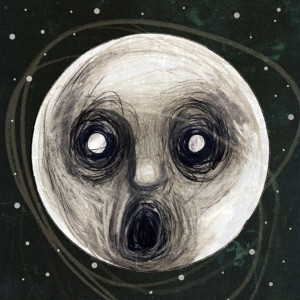 I’ve come to a downer of a realization in that I am experiencing an ever increasing disinterest in the new music being released by one of my favorite artists ever, the prolific and amazing Steven Wilson. He’s worthy of those two adjectives still, the first because its true (Porcupine Tree/ Solo Albums/ Blackfield/ Bass Communion/ No Man/ Storm Corrosion/ various production work), and the second because to me and many others, he’s responsible for some of the most inspired, interesting, and emotive music that I’ve ever heard, regardless of genre, period.
I’ve come to a downer of a realization in that I am experiencing an ever increasing disinterest in the new music being released by one of my favorite artists ever, the prolific and amazing Steven Wilson. He’s worthy of those two adjectives still, the first because its true (Porcupine Tree/ Solo Albums/ Blackfield/ Bass Communion/ No Man/ Storm Corrosion/ various production work), and the second because to me and many others, he’s responsible for some of the most inspired, interesting, and emotive music that I’ve ever heard, regardless of genre, period.
 There’s a moment on the new Darkthrone record, the typically Fenriz-esque titled The Underground Resistance, where you might smile and think to yourself, “These cheeky bastards.” Its at the start of “Valkyrie”, where Metallica-esque acoustic guitars chime in a ghost version of the reoccurring melody that carries this really bad-assed musical ode to classic metal of the 80s. Its a moment that I speculate was left in purely to piss off those people who tend to allow themselves to get pissed off over newer Darkthrone music.
There’s a moment on the new Darkthrone record, the typically Fenriz-esque titled The Underground Resistance, where you might smile and think to yourself, “These cheeky bastards.” Its at the start of “Valkyrie”, where Metallica-esque acoustic guitars chime in a ghost version of the reoccurring melody that carries this really bad-assed musical ode to classic metal of the 80s. Its a moment that I speculate was left in purely to piss off those people who tend to allow themselves to get pissed off over newer Darkthrone music.